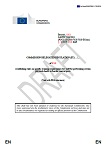Foodlaw-Reading
Dr David Jukes, The University of Reading, UK
![]()
|
|
Commission Consultation, 17 January 2019
 |
COMMISSION DELEGATED REGULATION (EU) …/... of XXX establishing rules on specific training requirements for staff for performing certain physical checks at border control posts A copy of this draft is available on this site (click on image). For more details, see the consultation page at: https://ec.europa.eu/info/law/better-regulation/initiatives/ares-2019-275600_en. Consultation closes 14 February 2019. |
The following are the recitals from the draft regulation:
Regulation (EU) 2017/625 establishes rules on the performance of official controls by the competent authorities of the Member States on animals and goods entering the Union in order to verify compliance with Union agri-food chain legislation.
Article 5(4) of Regulation (EU) 2017/625 requires that all staff performing official controls and other official activities must receive appropriate training for their area of competence. Chapter I of Annex II to Regulation (EU) 2017/625 sets out subject matters for the training of staff performing official controls and other official activities.
Article 21(2)(c) of Regulation (EU) 2017/625 requires that competent authorities perform official controls on animals presented at border control posts to verify compliance with animal welfare requirements and in particular with the rules applicable to their transport into the Union. Such official controls are to include controls on the fitness of animals being transported and on the means of transport.
Article 21(3) of Regulation (EU) 2017/625 requires that during the performance of official controls competent authorities take the necessary measures to prevent or reduce to a minimum any delay between the loading of the animals and their departure. If animals have to be detained during transport for more than two hours, competent authorities are to ensure that appropriate arrangements are taken for their care and, where necessary, their feeding, watering, unloading and accommodation. It is therefore appropriate that staff assisting the official veterinarian in the performance of physical checks on animals at border control posts are specifically trained for that purpose.
Article 47(1) of Regulation (EU) 2017/625 provides that certain categories of animals and goods coming from third countries are to be subject to official controls at the border control post of first arrival into the Union. In accordance with Article 49(1) of that Regulation such official controls are to include documentary checks, identity checks and physical checks.
Article 49(2) of Regulation (EU) 2017/625 provides that the physical checks are to be performed by an official veterinarian where those checks concern animals, except aquatic animals, or meat and edible meat offal. The official veterinarian may be assisted by staff trained in accordance with the requirements established under that Regulation in veterinary matters and designated by the competent authorities for that purpose. It also provides that the physical checks are to be performed by an official veterinarian or by staff trained in accordance with the requirements established under that Regulation and designated by the competent authorities for that purpose where those checks concern aquatic animals, products of animal origin other than meat and edible meat offal, germinal products or animal by-products.
Accordingly, staff performing physical checks as part of official controls on animals and certain categories of goods at border control posts are required to be more specifically trained for that purpose. The training should ensure that such physical checks are performed with the same degree of competence at all border control posts.
Directive 2005/36/EC of the European Parliament and of the Council [see Note 1 below] sets out a detailed study programme for veterinary surgeons. This study programme includes subjects such as anatomy, pathology, parasitology, clinical medicine, veterinary state medicine and public health, veterinary legislation, animal production and food hygiene (inspection and control of foodstuffs of animal origin, food hygiene and technology and practical work, including practical work in places where slaughter of animals and processing of foodstuffs take place). Knowledge of these subjects is necessary for the competent performance of physical checks on animals, products of animal origin, germinal products and animal by-products. It is therefore appropriate to set out specific training requirements for staff other than official veterinarians to attain the required standard of performance. At present, no need for introducing specific training requirements for official plant health officers going beyond existing requirements has been identified. Therefore, it is not necessary for official veterinarians and official plant health officers to fall within the scope of this Regulation.
Member States should be permitted to designate staff which, even though they did not follow the training programme in accordance with this Regulation, completed the training activities or the programmes for the exchange of staff referred to in Article 130 of Regulation (EU) 2017/625, provided that such activities or programmes cover the same subject matters as required by this Regulation.
Commission Decision 93/352/EEC [see Note 2 below] lays down rules concerning the designation of an official agent, who is specifically trained for carrying out checks on fish at border inspection posts located in ports where fish are landed. As the scope of that Decision is covered by Regulation (EU) 2017/625 and the training requirements are laid down in this Regulation, it should be repealed.
Regulation (EU) 2017/625 applies from 14 December 2019. Accordingly, the rules laid down in this Regulation should also apply from that date,
Notes:
1 Directive 2005/36/EC of the European Parliament and of the Council of 7 September 2005 on the recognition of professional qualifications (OJ L 255, 30.9.2005, p. 22).
2 Commission Decision 93/352/EEC of 1 June 1993 laying down derogations from the conditions of approval for border inspection posts located in ports where fish is landed (OJ L 144, 16.6.1993, p. 25).